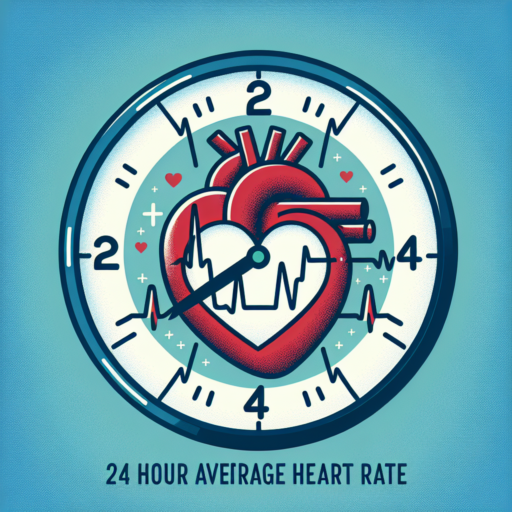What should be the average heart rate for 24 hours?
Understanding the average heart rate over a 24-hour period is essential for highlighting overall cardiovascular health and fitness levels. Generally, an adult’s average heart rate should be between 60 and 100 beats per minute when at rest. However, this range can fluctuate based on various factors including age, fitness level, and the presence of any underlying health conditions. It is crucial to monitor these variations as they provide valuable insights into the heart’s efficiency and stamina over time.
During a typical day, the heart rate can vary based on activity levels. During periods of intense physical activity, it is normal for the heart rate to increase significantly above resting levels, potentially reaching up to 160 beats per minute or more, depending on the individual’s age and fitness. This increase supplies the body with the necessary oxygen and nutrients needed during exertion. Conversely, during sleep, the heart rate typically lowers, reflecting the body’s decreased metabolic needs, which is a critical recovery phase for cardiovascular health.
Continuous monitoring or tracking of the heart rate over 24 hours can provide a comprehensive snapshot of heart health. Devices like fitness trackers and smartwatches allow for such monitoring, highlighting not just peaks and troughs but also the overall variability within a day. This variability is a good indicator of how well the heart responds to various stressors and rest periods. A lower variability may signify stress or potential heart health issues, alerting individuals to seek medical advice.
How many heart beats are normal in 24 hours?
Determining the normal heart rate within a 24-hour period involves understanding the average beats per minute (BPM) over time. Generally, an adult’s heart beats about 60 to 100 times per minute when resting. When you multiply this rate by the number of minutes in a day, you end up with a broad range that can be considered normal.
Mathematically, this translates to anywhere between 86,400 and 144,000 heartbeats in a day assuming the heart rate stays constant, which it does not due to fluctuations caused by activities, emotions, and sleep. During periods of deep sleep, for instance, the heart rate can dip lower, reducing the total count, while exercise can significantly increase it.
Understanding your personal normal requires tracking your heart rate over time and noting how it varies with activity and rest. Devices like smartwatches and fitness trackers can help gather this data more seamlessly, providing a clearer picture of what’s normal for you within the 24-hour period. Remember, what’s considered normal varies widely among individuals depending on age, fitness level, and overall health.
What is the average resting heart rate over 24 hours?
Understanding the average resting heart rate over a 24-hour period is vital for assessing overall cardiovascular health. Generally, a normal resting heart rate for adults ranges from 60 to 100 beats per minute (bpm). However, various factors such as age, fitness level, and overall health can influence this metric. Athletes or individuals with a higher level of fitness may exhibit lower rates, often between 40 to 60 bpm, indicating more efficient heart function and cardiovascular health.
Monitoring the resting heart rate continuously over 24 hours provides a comprehensive view of the heart’s behavior during different phases of the day, including both active and rest periods. It is during sleep that the resting heart rate reaches its lowest point, offering insights into the heart’s efficiency and health. The importance of understanding individual variations is underscored by recognizing how lifestyle choices, stress levels, and even hydration can affect the heart rate.
Advancements in wearable technology have made tracking the average resting heart rate over 24 hours more accessible. These devices offer detailed insights into heart behavior, allowing users to identify any unusual patterns, such as heart rate spikes or dips, that might warrant further medical investigation. The data collected can be invaluable for guiding lifestyle and health decisions aimed at improving or maintaining optimal heart function.
No se han encontrado productos.
What is normal heart rate at 24?
Understanding the normal heart rate at the age of 24 is essential for maintaining optimal health and wellbeing. Generally, for adults aged 18 and over, including those in their mid-twenties, a normal resting heart rate ranges from 60 to 100 beats per minute (bpm). However, it’s important to note that individual physical condition, activity level, and emotional state can influence heart rate significantly.
Factors such as exercise habits, presence of medical conditions like heart disease or thyroid disease, and even the use of certain medications can cause variations in one’s resting heart rate. Athletes and individuals who are highly active might experience a lower resting heart rate, often between 40 and 60 bpm, due to their increased heart efficiency.
Monitoring your heart rate can provide valuable insights into your cardiovascular health. If you are 24 and concerned about your heart rate, whether it feels too slow or too fast during periods of rest or activity, consulting with a healthcare professional is recommended. They can offer personalized advice and, if necessary, conduct further evaluations to ensure your heart is functioning properly.




